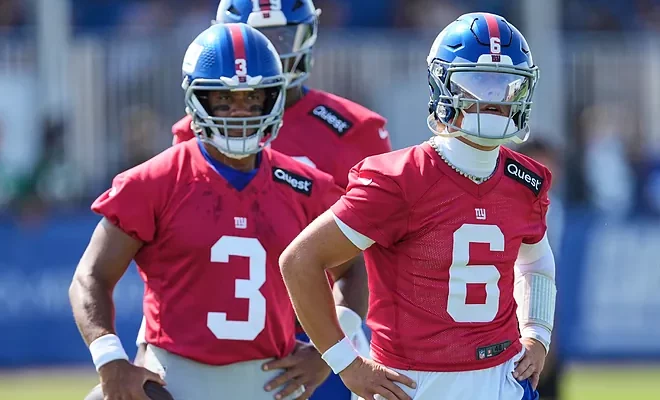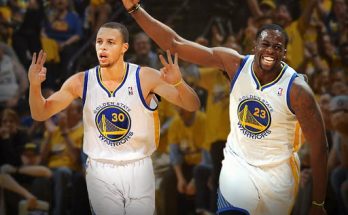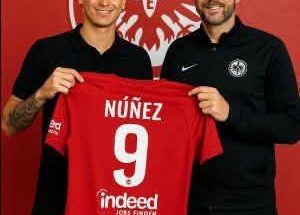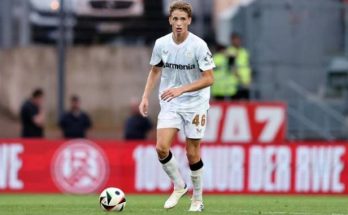The New York Giants have officially placed one of the most pivotal decisions in their franchise’s future in the hands of offensive coordinator Mike Kafka, deferring all developmental pathways for rookie quarterback Jaxson Dart to the man whose influence was once critical in shaping the early NFL career of Patrick Mahomes with the Kansas City Chiefs. This move, though unsurprising to some around the league who have witnessed Kafka’s steady rise as one of the brightest offensive minds, represents a significant declaration of faith in his ability to replicate his previous success with another talented but raw quarterback prospect. For the Giants, the transition into a new era under Dart is as much about patience and infrastructure as it is about talent and timing, and Kafka’s track record provides a sense of reassurance that this delicate process is in capable hands.
Jaxson Dart, the highly-touted quarterback whose college career was filled with flashes of brilliance and moments of high-pressure performance, arrives in New York at a time when the franchise is seeking a long-term answer at the position. The Giants, after years of inconsistency and offensive struggles, are determined to create a foundation that allows a young quarterback to thrive rather than falter under premature expectations. In that regard, the hiring of Mike Kafka in 2022 was not just about play-calling; it was about building an offensive culture that could one day shepherd a quarterback of Dart’s profile into becoming a franchise cornerstone. Kafka’s experience with Mahomes has been repeatedly referenced by the Giants’ front office, as they believe his insight into nurturing elite talent will be a decisive factor in Dart’s trajectory.
Kafka’s time in Kansas City provided him with a unique blueprint for quarterback development that balances aggressive growth with a measured learning curve. Mahomes, who is now widely considered one of the most talented and accomplished quarterbacks in the modern NFL, benefited greatly from having a coaching staff that understood how to prepare him for the complexities of the league without overwhelming him in his rookie season. Under Andy Reid, with Kafka playing a key role in Mahomes’ quarterback room, the Chiefs were able to gradually unleash Mahomes’ skill set while giving him time to adjust to the speed and intricacy of NFL defenses. That approach paid enormous dividends, as Mahomes would go on to become a league MVP and Super Bowl champion in just his second year as a starter.
The Giants are hoping that Dart can follow a similar arc, though the circumstances surrounding his entry into the league differ in many ways from Mahomes. While Mahomes entered a stable situation with an experienced quarterback, Alex Smith, holding the starting role in Kansas City, Dart arrives in New York at a time when the quarterback room is in transition. Daniel Jones, who was once viewed as the future of the franchise, has faced setbacks due to injuries and inconsistent play. The decision to draft Dart was both a statement of intent and an acknowledgment that the Giants need to prepare for a new chapter, even if it means allowing their rookie to sit behind a veteran or learn gradually in real-time.
For Kafka, the challenge is not just about teaching Dart the nuances of the Giants’ offensive scheme but about instilling the confidence, decision-making, and adaptability required of a successful NFL quarterback. Dart’s college tape shows a player who thrives under pressure, capable of making off-script plays and delivering accurate throws from multiple arm angles, reminiscent in some ways of the improvisational brilliance that Mahomes brought from Texas Tech. Yet, while those raw tools are exciting, they also require refinement. The NFL’s defenses are faster, more complex, and less forgiving, and Kafka knows that developing Dart’s mental processing will be just as important as harnessing his physical talents.
The trust between Kafka and the Giants’ front office has been building over the past few seasons. Since his arrival, Kafka has been seen as not only an offensive strategist but also a teacher who can connect with players on a personal level. His background as a former NFL quarterback, albeit not a star, gives him credibility in quarterback rooms. Players respect that he has experienced the challenges of the position firsthand. His reputation for patience, combined with an analytical approach to game planning, has made him a favorite among both players and staff. It is this blend of technical knowledge and emotional intelligence that the Giants believe will be crucial in shaping Dart’s development.
The story of Jaxson Dart’s transition to the NFL is as much about opportunity as it is about preparation. Coming out of college, Dart was viewed as a dynamic quarterback who had both the arm strength and athleticism to be a modern dual-threat signal caller. His collegiate career, marked by a mix of highlight-reel throws and resilient performances in high-stakes games, elevated his draft stock to the point where the Giants felt compelled to secure him as their quarterback of the future. But drafting a quarterback is only the first step. The NFL is filled with cautionary tales of talented young quarterbacks who were thrown into the fire too soon, only to see their confidence and mechanics deteriorate under the weight of expectations. The Giants are determined not to let Dart become one of those stories.
Kafka’s role, therefore, is not just as a coach but as an architect of Dart’s future. He must design an environment where Dart can gradually master the offense, learn the subtleties of defensive coverages, and develop the mental resilience required to succeed in one of the league’s toughest markets. New York, with its demanding media landscape and passionate fanbase, is not a place that easily forgives mistakes. The Giants’ leadership understands this pressure, which is why they are leaning on Kafka’s expertise to shield Dart from undue scrutiny while still fostering his growth.
The parallels to Mahomes are both intriguing and instructive. When Mahomes was drafted by the Chiefs, there were questions about his readiness, his ability to operate in a pro-style offense, and whether his risk-taking playstyle would translate to the NFL. Under the careful guidance of Reid and Kafka, those concerns were addressed methodically. Mahomes learned the intricacies of Reid’s offense, observed how Alex Smith handled the responsibilities of a starting quarterback, and absorbed the finer points of preparation and leadership. By the time Mahomes took over the starting role, he was not only ready but poised to dominate.
The Giants hope that Kafka can engineer a similar developmental curve for Dart, even if the surrounding cast and circumstances are different. The offensive line, a perennial area of concern for the Giants in recent years, must provide adequate protection to give any quarterback—rookie or veteran—a chance to succeed. Additionally, the receiving corps must continue to develop chemistry and reliability. While Kafka can control the design of plays and the teaching of concepts, the success of Dart’s transition will also depend on the team’s overall offensive structure.
The decision to defer Dart’s development entirely to Kafka is also a testament to the continuity and trust the Giants are trying to establish within their coaching staff. Stability has been a rare commodity for the Giants in recent seasons, with frequent coaching changes and inconsistent offensive philosophies contributing to a lack of progress. By empowering Kafka, the front office is sending a clear message that they value consistency and believe in the vision he has for the offense. It is a long-term play, one that prioritizes the gradual building of a system over short-term results.
Dart himself has embraced this developmental approach. In interviews, he has spoken highly of Kafka’s mentorship, noting that his new offensive coordinator has already begun breaking down the game in ways that feel both challenging and enlightening. Dart understands that transitioning from college to the NFL is not just about physical talent but about mastering the mental side of the game. Reading defenses, adjusting protections, understanding pre-snap disguises—all of these elements require time and repetition, and Dart appears willing to commit to that process without rushing to prove himself prematurely.
For Giants fans, the prospect of watching another quarterback experiment unfold brings a mix of excitement and cautious optimism. The memories of past failures at the position linger, but the organization’s current plan feels more deliberate and well-structured than some of the rushed rebuilds of previous years. Kafka’s track record with Mahomes gives fans a reason to hope that Dart’s potential can be unlocked in a way that aligns with modern offensive trends, where creativity and adaptability often separate good teams from great ones.
As the Giants prepare for the upcoming season, much of the attention will naturally center around how Kafka manages his dual responsibilities of game-planning for the team’s current needs while also grooming Dart for the future. It is a balancing act that requires both strategic foresight and day-to-day execution. The coaching staff will have to determine how much of the playbook Dart can realistically absorb in his first year and whether he will benefit from live game reps or a more measured approach from the sidelines.
The lessons Kafka learned in Kansas City will likely inform every decision he makes with Dart. One of the hallmarks of the Chiefs’ success was their ability to adapt their system to the strengths of their quarterback. Rather than forcing Mahomes into a rigid scheme, Reid and Kafka allowed his natural talents—his mobility, his arm angles, his vision—to flourish within a flexible framework. For Dart, who possesses a similar improvisational ability, the key will be striking the right balance between creativity and structure. Too much freedom too soon can lead to mistakes, but too much rigidity can stifle the very qualities that make him special.
The Giants’ offensive philosophy under Kafka is expected to evolve as Dart develops. Early reports from offseason workouts suggest that Kafka is focusing on building a strong foundation of fundamentals—footwork, timing, and progression reads—while gradually layering in more complex concepts. This step-by-step approach mirrors what he witnessed with Mahomes, who, despite his immense talent, needed time to refine the details of his mechanics and decision-making.
Another critical aspect of Kafka’s role will be fostering leadership qualities in Dart. Quarterbacks are not just expected to execute plays; they are expected to command the huddle, inspire confidence, and serve as the face of the franchise. These intangibles are often developed through experience and mentorship. In Kansas City, Mahomes benefited greatly from the presence of Alex Smith, who was not only a mentor but also a consummate professional in his approach. The Giants will need to determine whether a similar veteran presence can help Dart acclimate or if Kafka himself will take on an even greater role in shaping Dart’s leadership journey.
There is also a broader strategic element at play for the Giants. By entrusting Dart’s development to Kafka, the team is implicitly linking its future success to the offensive identity that Kafka is building. If Dart flourishes, Kafka’s reputation as a quarterback whisperer will grow even further, possibly leading to head coaching opportunities down the line. But for now, the Giants are fully committed to leveraging his expertise to lay the foundation for a quarterback-driven offense that can compete with the elite teams in the NFC.



